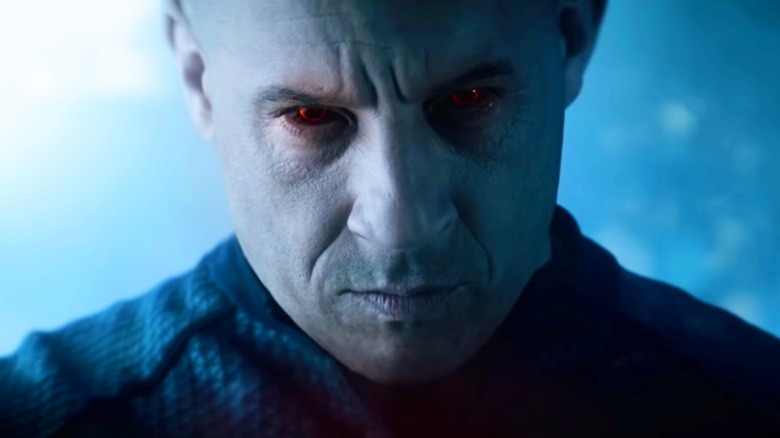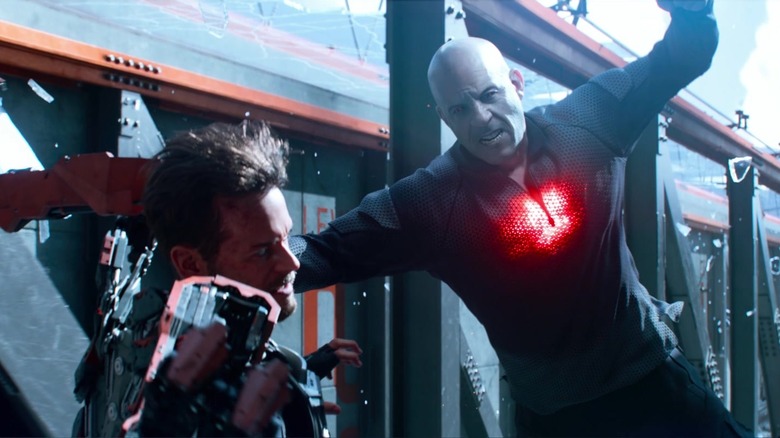Bloodshot Review: Solid Action And A Big Missed Opportunity
For a brief, glorious moment, it looks like Bloodshot is going to do something different.
Not at first, of course. At the beginning, Bloodshot is a run-of-the-mill superhero origin story. A brave soldier named Ray Garrison (Vin Diesel) returns home from a highly classified mission and reunites with his beautiful wife Gina (Talulah Riley), only for tragedy to strike. Terrorists kill Gina and put a bullet in Ray's head.
When Ray wakes up, he learns that he's been resurrected by high-tech nanobots which give him super-strength, an enhanced healing factor, and other special abilities. It doesn't take long for Ray to decide to use his powers for good — but first, he has to track down the man who killed Gina and get his revenge.
You've seen this all before. A brief training sequence in which the hero learns how his new powers work. A woman getting fridged (quite literally — Gina's execution takes place in a meat locker) to give the main character a tragic backstory. A team of quirky supporting characters who don't like each other but get the job done when the chips are down.
But then, Ray catches his prey and kills him before the end of the first act. Suddenly, you realize that everything you've seen so far has been a lie (although if you've seen Bloodshot's trailers, you probably already figured that out). The terrorist? Not really a terrorist. Gina? Not really dead — if she even exists at all.
See, poor Ray is the unwitting victim of Rising Spirit Technologies, the same company that brought him back to life. After every mission, RST uses the nano-tech to wipe and alter Ray's memories, framing a different man for Gina's murder each time. When Ray wakes up, having just re-lived the trauma, he's ready for more revenge. RST points Ray at the next target and lets him handle the dirty work.
It's basically the reveal at the end of Christopher Nolan's Memento with a superhero makeover (in case the parallel wasn't clear enough, Guy Pearce plays Bloodshot's villain, RST founder Emil Harting), and it's a clever spin on a tired trope. At one point, it feels like Bloodshot is going to deconstruct the superhero origin story. Pearce even makes a few cracks about how generic and cliched Ray's fake backstory is. Meanwhile, when Ray begins digging into his past — his real one — it seems like more bombshells are going to drop.
They don't, though. Not really. Aside from a few tidbits about his relationship with Gina, we never really learn who Ray was before RST got their hands on his corpse. Ray catches on to RST's manipulation pretty quickly, and shifts his sights from Gina's fictional murderer to Pearce's army of cybernetically enhanced soldiers.
From there, things once again go more or less how you'd expect. It's not so much bad as it is disappointing. Bloodshot's big twist is its biggest draw, but it never really does anything interesting with its setup. Cheesy dialogue, thinly sketched character beats, and lots of action. That's really all there is to it.
At least that action is very, very good.
Super heroics with an edge
Bloodshot is director David Wilson's first feature film, but he worked for years at effects and animation company Blur Studios, where among other things he directed fast-paced, action-heavy trailers for top video game franchises. You can see how that experience paid off in Bloodshot. While the story plays things too safe, Bloodshot's action scenes are slick, exciting, and a whole lot of violent fun.
Bloodshot's first major action sequence is its best, even if it doesn't make much sense. Right before the scene, Bloodshot crashes a flour truck, coating everything in white. Why a flour truck? Because the dust filtering through the air gives the scene a dream-like haze, while the white surfaces look stunning in the scene's deep red light.
A lot of Bloodshot is like that. It looks cool, but it doesn't make much sense. Thankfully, you won't have much time to think about it. After the initial exposition dump, you rarely have to wait more than a few minutes before another fight breaks out. Bloodshot pushes its PG-13 rating as far as it'll go, too. In fact, while Bloodshot is based on a superhero comic, its overall vibe is closer to '80s sci-fi thrillers like Total Recall and The Terminator. It's not gory, but there's an edge to Bloodshot's super heroics that you just don't get from DC or Marvel.
As expected, Bloodshot's visual effects are great. Its acting, less so. Diesel has surprising range, but you won't see much of it on display here. Here, he's all brooding, all the time. Supporting cast members like Pearce and Baby Driver's Eiza González don't fare much better, although it's hard to tell if it's their fault. Bloodshot's dialogue never rises above mediocre, and the movie doesn't leave a whole lot of room for character development.
In fact, as a whole, there's something off about Bloodshot's pace. Individual scenes hold up fine, but for such a busy film, it doesn't feel like much actually happens. Some moments are overplayed. Others would benefit from a little more screen time. The story lacks focus and cohesion. It all adds up to a movie that feels like it was drastically reconfigured in the editing room, probably after lengthy reshoots (that's just a feeling, of course, although the film's last-minute delay hints at some behind-the-scenes turmoil).
Ultimately, there's nothing about Bloodshot that's so bad it's offensive. If all you're looking for are visceral, stylish fight scenes, you'll find them. If you're looking for more, Bloodshot will feel like a missed opportunity. There's nothing wrong with a disposable action flick, of course, but Bloodshot promises more. Unfortunately, it doesn't quite deliver.

